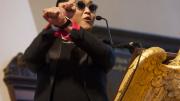Donning a dark suit and his signature black sunglasses, Korean rapper and international YouTube sensation PSY told a large Harvard audience last night in Memorial Church that he was “shocked” and humbled to be invited to the podium. But the “Gangnam Style” pop star hardly seemed nervous, riffing about his meteoric rise to stardom for more than an hour, which forced a scheduled audience question-and-answer session and discussion to be limited due to time constraints. (PSY was invited to the University by the Korea Institute.)
If anything, PSY (whose real name is Park Jae-sang) showed his audience just how much confidence 1.6 billion YouTube views—a record for the website—can instill in an artist. “This is really weird, isn’t it?” he asked the audience. “After 14 years, who knew I’d come back to [give] a speech at Harvard? Isn’t life beautiful?”
The 35-year-old musician, known more for his infectious, wacky dance moves than his lyrics, recalled attending Boston University School of Management in the mid 1990s, where he was known by the nickname “WWF”—for “withdraw, withdraw, fail.” Recalling how he admired Harvard from across the river, he joked that he was the first person to make a speech at the University without a written script. “I’m not here to do something academic or educational,” he said. “I’m just here to tell you about my experience.”
And what an experience it has been, as PSY told story after story of being invited to movie stars’ homes, dancing on stage with Madonna at Madison Square Garden, teaching Britney Spears his signature bent-knee, hip-swivel move, and becoming a recognizable celebrity virtually wherever he goes.
Young professor of Korean history Carter Eckert—who in tribute also donned sunglasses as he introduced the star—called PSY a prime example of the modern, global digital-culture phenomenon. “As I told PSY this morning,” Eckert said, “you are now an academic commodity—we study you!”
The rapper, who has been well known in South Korea for a decade, said he could not have foreseen his worldwide fame. He decided to write “Gangnam Style” after a bad economic year in Korea, with his “only goal” being to make people laugh. “I tried my best to be as ridiculous as possible,” he said. When the video was first uploaded to YouTube in July 2012, he said he checked it every now and then, seeing mostly comments in Korean. Then one day he began seeing comments in English, Portuguese, and other languages he couldn’t understand. “I was like, is this a good or bad thing?” he joked.
The turning point came, he said, when musicians and actors including Katy Perry, Britney Spears, and Tom Cruise began to share his video on their Twitter accounts. Soon after, he got a call from singer Justin Bieber’s manager and was on the next flight to Los Angeles, where he made television appearances and mingled with his fellow superstar fans, like Spears, whom he taught to “Gangnam Style” dance on the Ellen show.
After critics called him a “one-hit wonder,” PSY said he knew he had to build upon his success. His most recent music video, “Gentleman,” received more than 20 million hits on YouTube within 24 hours after its release last month, besting the previous website record of 8 million views for Bieber’s song “Boyfriend.”
“There should be a specific reason why people chose me,” he said. “They didn't choose me because I'm handsome, they didn't choose me because I’m muscular…the reason why they chose me is because I have fun with the music, with the dance, with the video.”









